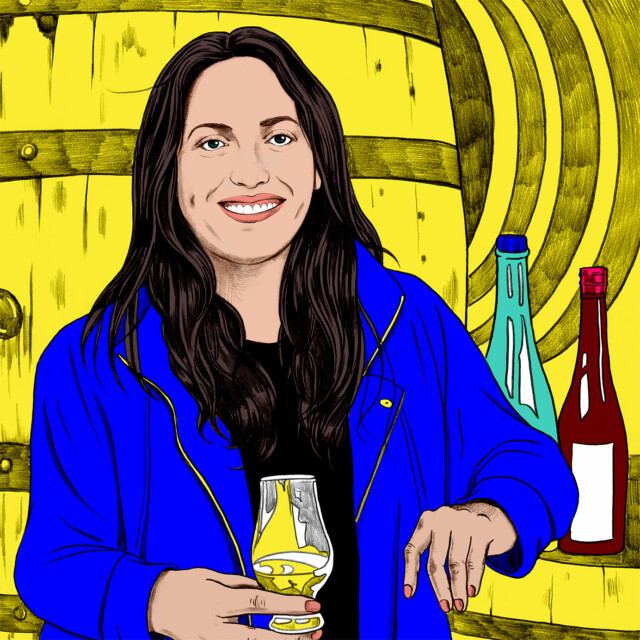Typically, when a craft distiller attempts to make every spirit, none of them turn out especially well. It’s the classic jack of all trades, master of none. And the logic is simple: Try to appease every demographic — bourbon taters, vodka fans, tequila connoisseurs, rum nerds — and no one ends up truly satisfied.
Then there’s Matchbook Distilling, with its dazzling array of spirits and more — all created by Leslie Merinoff Kwasnieski.
Since co-founding Matchbook in 2016 with her husband, Brian, and Paul Monahan, Merinoff Kwasnieski and her small team haven’t just made all the spirits, they’ve made spirits that have never been made before.
“[When I started,] I thought there were too many replicas of spirits,” Merinoff Kwasnieski says. “I felt there were too few voices on the shelves.”
Her initial goal had been to elevate those voices by acting as a contract distiller for others with unique ideas. She quickly realized, however, that many aspiring distillers didn’t even know what they didn’t know.
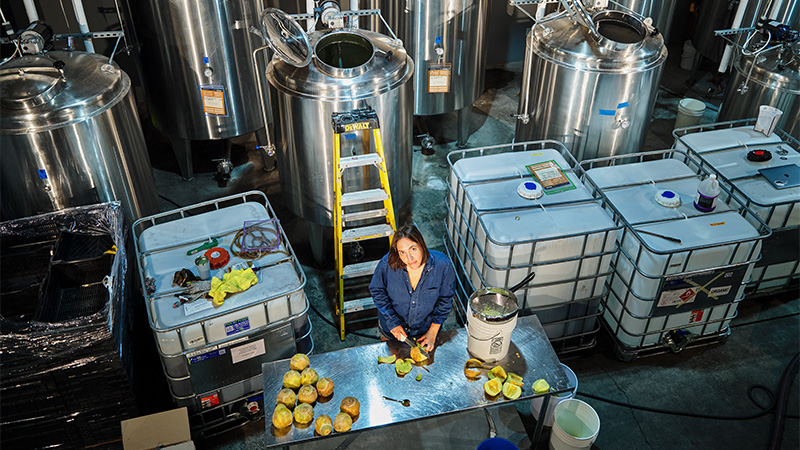
“People didn’t know that you could make an aperitif from fermented local peaches,” Merinoff Kwasnieski says. “Or a single malt smoked with Northeastern seaweed.”
During Covid, sequestered away from society in her 38,000-square-foot distillery — a former boat-parts storage facility — she began distilling her own visions, with no customers or bosses to answer to. Matchbook started releasing two unique spirits each month.
“My philosophy [was to] keep refining my process, honing my skills, discovering all the flavors and aromas available out there in the natural world,” Merinoff Kwasnieski says. “I champion local agriculture and biodiversity and I think our production should reflect that at least most of the time.”
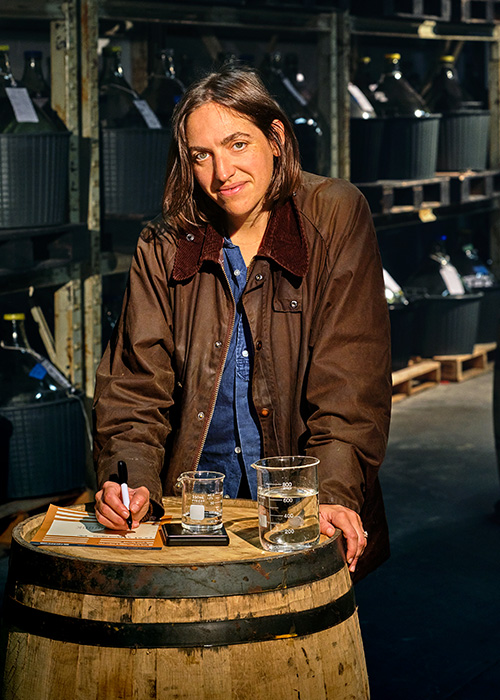
At the Matchbook tasting room today in Greenport, N.Y., on Long Island’s North Fork — the less trendy, more laid-back, and far more artisan mirror to the Hamptons across the bay — even the most adventurous spirits geek would feel overwhelmed by the sheer number of intriguing options.
Among the lineup: Ritual Sister, a spirit distilled from smoked pineapple; Late Embers, made from sunchokes and honey and faintly reminiscent of mezcal; and Daytrip Strawberry Amaro, crafted from strawberry wine and eau de vie, then macerated with nettles, quassia, jasmine, rose, and nutmeg fruit.
Other rarities include Flatlander, an Oaxacan corn whiskey made pechuga-style with aji amarillo peppers and local goose, finished in mezcal casks; Primates: Wanderlust ≠ Lost Wandering, a yuzu triple sec; and Jenny Lind Aperitif, distilled from an heirloom melon nearly lost to history.
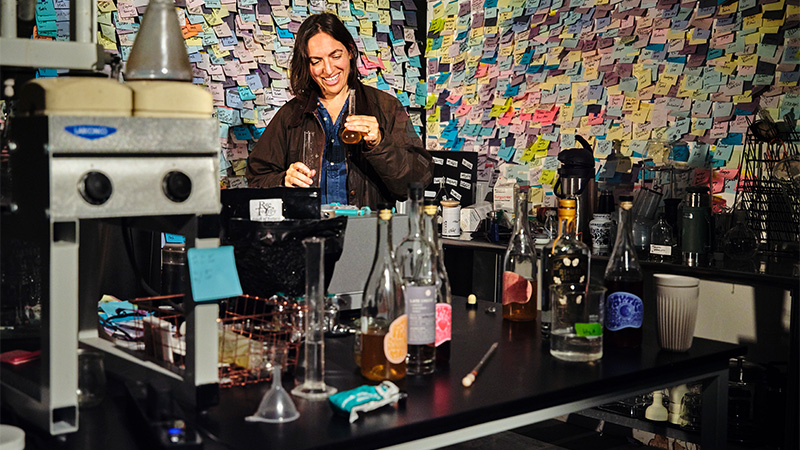
These spirits are unapologetically unique — an auteurist’s vision of alcohol — yet they aren’t pretentious, overpriced (as most craft spirits are), or inaccessible. They shine neat and as vital cocktail components. That’s why some of New York’s most flavor-focused bars — whether Eleven Madison Park, Thai Diner, or Four Horsemen — collaborate with Matchbook on custom spirits.
“I’ve created a large body of work and each production has improved my process, my skill set, my intuition,” Merinoff Kwasnieski says. “I think of myself as a sort of perfumer alchemist, trying to practice a sort of transfiguration of the peak moments of the natural world into the bottle.”
Interesting ingredients from local farmer friends often arrive on her doorstep at peak flavor ripeness, sparking new experiments. While many larger distilleries rely on automation, Merinoff Kwasnieski does everything by hand — from processing fruit and milling grain one bucket at a time to cleaning and repairing her equipment.
In some ways, this is the life she was destined for. Merinoff Kwasnieski is a descendent of Hiram Walker, the 19th-century whiskey mogul. Her father, Charles Merinoff, runs Breakthru Beverage Group, one of North America’s largest wine and spirits wholesalers; while she credits her mother, a New York City artist, with providing creative inspiration.
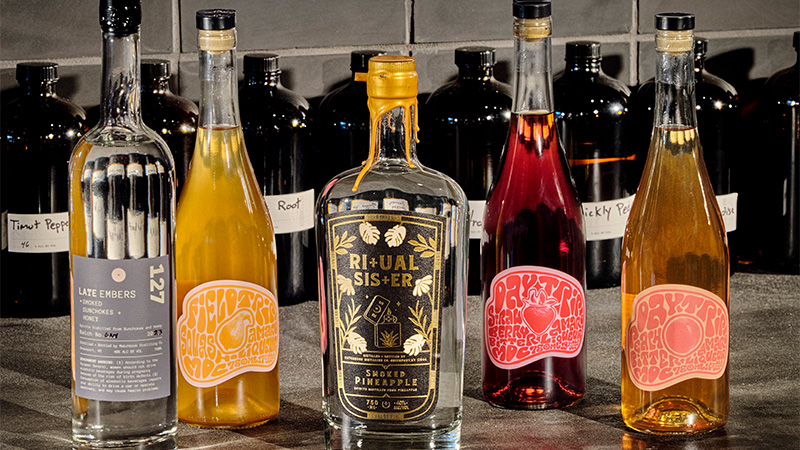
Merinoff Kwasnieski first dipped her toes into the industry while homebrewing at the University of Vermont, then later started an event marketing company called Broke in Burlington. She entered the spirits business as a brand manager at Sailor Jerry Rum, helping the brand cross 1 million cases sold. She began distilling in earnest at The Noble Experiment Distillery in New York before leaving to start Matchbook.
“I still think there’s so much room to grow,” she says of the spirits industry overall. “The interest in Japanese whisky, in mezcal and other agave spirits, Jamaican rums, Italian amari — it has sparked something!”
Merinoff Kwasnieski has even begun working on more categorically “normal” spirits — those with history, standards, and certain consumer expectations. But true to form, she will tackle them in her own unique way rather than making yet another pale replica.
“I think Buffalo Trace makes Buffalo Trace really well — nobody needs an imitation,” she says. “But do you know what they don’t do? They don’t make a bourbon with roasted oats that finishes with a rich sesame, sometimes chocolaty flavor explosion.”
They also don’t make a single-malt whiskey smoked with North Fork seaweed. Nor a peach amaro made from just-picked New York peaches.
Says Merinoff Kwasnieski, “Who is capturing that in the bottle to enjoy all year round?”
